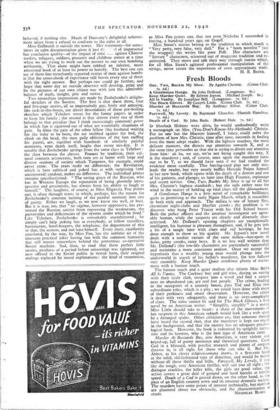Fresh Bloods
One, Two, Buckle My Shoe. By Agatha Christie. (Crime Club.
Death of a Cad. By John Bude. (Robert Hale. 7s. 6d.)
IF Sherlock Holmes were alive, he would undoubtedly write 'a monograph on Mrs. (You-Don't-Know-My-Methods) Christie. For no one but the Maestro himself, I fancy, could solve the problem of how Mrs. Christie' time after time, succeeds in fooling even the most adept reader. With the lightest touches the most delicate nuances, she directs our attention towards k, and at
the same time persuades us that she is trying to divert our attention from him: ah ha, we say, we're not being caught this way, X is the murderer ; and, of course, once again the murderer turns out to be Y, as we should have seen if we had studied the evidence more carefully. This forcing-card play not only mis- leads the reader, but very nearly baffles Hercule Poirot himself
in her new book, which opens with the death of a dentist and one of his patients, and plunges us later into High Finance, espionage and secret service. One, Two, Buckle My Shoe is up -to all but Mrs. Christie's highest standards ; but she sails rather near the wind in the matter of holding up vital clues till the denouement.
A Gentleman Hangs is a first novel of remarkable brilliance, quite as promising as the early Ngaio Marsh, which it resembles in both style and approach. The milieu is one of luxury flats, chromium night-clubs and Mayfair crooks ; the problem is to discover who hung Peter Tracey with his Old School braces. Both the police officers and the amateur investigator are agree- ably human' while the suspects are -clearly and diversely char- acterised. Mr. Dolkod's opening chapters are exceptionally intelligent, his humour is pleasant throughout, and, if he gets into a bit of a tangle later with clues and red herrings, he has done enough to show us his quality. Mr. Jepson's new novel deals with a seedier variant of the same milieu—hot-spots in Soho, petty crooks, razor boys. It is no less well written than Mr. Dollond's (the low-life characters are particularly successful) and maintains a more consistent realism. Once we accept the hypothesis that a wealthy young man would plunge into the underworld in search of his father's murderer, the rest follows very smoothly. Keep Murder Quiet combines plenty of excite- ment with a human touch.
The human touch and a quiet realism also inform Miss Bell's All Is Vanity. The Cockney boy and girl who, during an outing with their cycle club, trespass into a wood and find a corpse near an abandoned car, are real live people. The crime, leading to the occupants of a country house, puts Ted and Elsie into subordinate roles, which is a pity ; we could have done with more of their perkiness and smart observation. However, the crime is dealt with very adequately, and there is no over-complexity of clues. The same cannot be said for The Black Gloves, a first novel by an American writer. "Simplify, simplify" is a motto Miss Little should take to heart : a chart of the movements of her suspects in this American suburb would look like a web spun by a deranged spider. Other criticisms are, that someone should have heard the second shot, that the murderer is kept too much in the background, and that the motive has no adequate psycho- logical basis. However, the book is redeemed by sprightly narra- tion and its heroine, Who is the best type of American cutie. Murder At Buzzards Bay, also American, is very violent and keyed-up, full of gooey moments and rhetorical questions. Cape Cod in a blizzard, with psychic research and plenty of corpses thrown in, is all right for those who can take it. But Mr. Abbot, as his clever eclaircissement shows, is a first-rate hand at the solid, old-fashioned type of detection, and would be better without all these thrills and frills. Farewell, My Lovely, if You like the tough, sexy American thriller, will suit you all right ; the dialogue crackles, the killer kills, the girls are good value, the action covers a great deal of ground and hard knocks at terrific speed. Death of a Cad is geared down, on the other hand, to the pace of an English country town and its amateur dramatic society. The murders have some points of interest technically, but motives are plastered about too obviously, and the characterisation is


























































 Previous page
Previous page